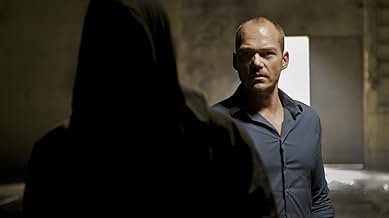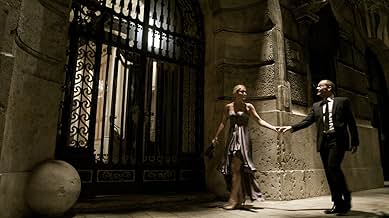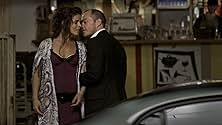The successful artist and playboy Juan is a notorious seducer of women, through his ability to be just what a woman dreams of: Charming, charismatic, strong, sensitive, sexual. Driven by a r... Read allThe successful artist and playboy Juan is a notorious seducer of women, through his ability to be just what a woman dreams of: Charming, charismatic, strong, sensitive, sexual. Driven by a restless urge to conquer new women, use them, and throw them away, he has hired his friend ... Read allThe successful artist and playboy Juan is a notorious seducer of women, through his ability to be just what a woman dreams of: Charming, charismatic, strong, sensitive, sexual. Driven by a restless urge to conquer new women, use them, and throw them away, he has hired his friend Leporello to help create a masterpiece: A filmed database of all the women whose dreams Ju... Read all
- Director
- Writers
- Stars
- Awards
- 5 nominations total
- Fan at Party
- (uncredited)
- Director
- Writers
- All cast & crew
- Production, box office & more at IMDbPro
Featured reviews
Frankly, I wouldn't wish Italian opera sung in English on my worst enemy; I would have preferred a "Juan" sung in Italian, but I guess English is the world language of update. One aspect of the film I did not enjoy was the English subtitles: why use them when everyone sang loud and clear? For me the best singer was Mikhail Petrenko (Leporello) followed by Christopher Maltman as Juan who looks sexy enough to conquer 1003 women in Spain.
Leporello's aria "One thousand and three" blew me away: his use of a Mac laptop and Mac software to display Juan's conquests is utterly brilliant.
Any modern, present-day setting of a classic opera is a huge gamble. It works when the director really knows what he's doing and has the artistic chops to pull it off, but sadly this one doesn't quite. He seems more interested in the modernized staging than in emphasizing the music. And most catastrophically, he introduces profanity into one of the highest human art forms. It then becomes a tasteless pandering to an extremely low common denominator, bordering on reality-TV. Perhaps it is an attempt to attract new audiences, but personally I find it wrongheaded. High art is about beauty and truth, and base profanity belongs in the gutter; it is not worth preserving for posterity in a full-scale original film production. I know many will find my view puritanical, but for me it's a question of beauty over ugliness. Profanity promotes and maintains negative emotions and has no noteworthy redeeming qualities. It certainly does not belong in opera.
Even at 105 minutes, I found this very altered and abridged version long enough to be tiresome, and I have no desire to watch it again.
My rating: 6 stars out of 10.
There are some productions of 'Don Giovanni' available, the Joseph Losey film being my favourites. On the other hand, there are also some not so good ones out there, the much maligned Calixto Bieito production is particularly wretched with only the Leporello and Elvira being redeeming merits.
Adapting opera to film is always a difficult task, and it is also difficult in making opera accessible to nowaday and younger audiences and doing something new while still respecting the opera. This said, there are some great opera films out there, like 1982's 'La Traviata' (love his 1986 'Otello' better than most), 1976's 'Tosca', 1979's 'Don Giovanni', 1984's 'Carmen and most of Jean Pierre Ponnelle's opera films.
Kaspar Holten's film version is interesting but doesn't completely come off. It is beautifully filmed, never looks cheap, garish or vulgar (the settings are quite handsome and the modern dress costumes are well suited for the characters) and there has not been a bolder, racier or more daring 'Don Giovanni'.
Not all the drama works. There are a lot of funny, seductive and frightening moments and one has to credit Holten for his bold and daring approach that is not too out of place, but some touches serve very little point and get in the way of the darkness and complexity of the story. People are also not going to like that it's very abridged, which makes the narrative in places less cohesive and a couple of the characters less interesting.
Also not so successful is the translation and English words. Not only is it awkwardly translated but there is also an overuse of profanity that was frankly not needed, don't mind profanity but if there is no particular reason for it to be there or if the words and such are at odds with the music and the rhythm (both of which are present here) it is a problem. Lastly the orchestra sound underpowered, which undermines the darkness, contrasting moods and huge dramatic intensity.
However, there is very little to complain about with the performances. Particularly good is Mikhail Petrenko who is a riot as Leporello (even if he does suffer from the worst of the crudities) and sings with warmth and immense character. Christopher Maltman is not far behind as a very seductive and menacing Don, his singing resonant, musical and expressive. The relationship between Don Giovanni and Leporello makes or breaks a production of 'Don Giovanni', but is more than convincing here.
Maria Bengtsson is a fiery and poignant Donna Anna without being too much of a victim, showing little sign of being taxed by her challengingly high Tessitura. Elizabeth Futral revels in Elvira's spitefulness but softens her in the second act. Katija Dragojevic is effortlessly charming and teasing as Zerlina, Ludvig Bengtson Lindström is effectively diffident and jealous and Eric Halvarson despite the odd bit of wooliness intimidates to terrifying effect as the Commendatore. Only the bland Ottavio of Peter Dodahl disappoints somewhat.
In conclusion, interesting and bold with superb singing and acting, but could have been much better. Not one for traditionalists or those who dislikes concept productions, but this reviewer does applaud this for trying. 6/10 Bethany Cox
Did you know
Details
Box office
- Gross worldwide
- $357,934
- Runtime
- 1h 45m(105 min)
- Color
- Aspect ratio
- 1.85 : 1










